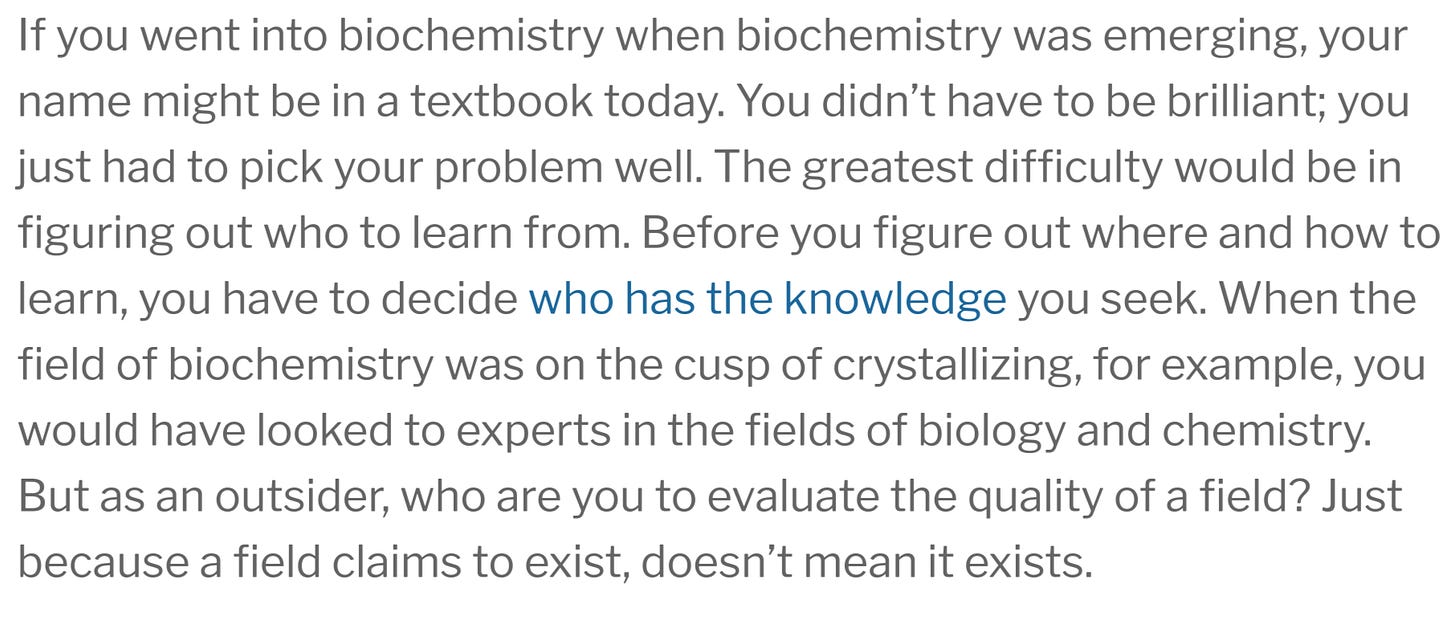We put together the Fractal University Orientation Guide as an ode to our values and culture.
You can read the whole thing here. The most delicious section of the packet is the Fractal University Canon, which is a collection of inspiring blog posts about science, the thrill of the frontier, and the call to do great work. It starts on page 5.
I hope it inspires you to do great work.
A Summary of the Orientation Packet
If you don’t have time to peruse the PDF right now, here are some ideas I want to highlight.
Fractal University aims to nurture great students, teachers, researchers, and craftsmen; but how?
Each individual must cultivate their own vision; to help, we created this Orientation Guide, a shared Canon which all students and teachers read.
First, we establish an Etiquette:
Take yourself and others seriously
Be concrete; no bullshitting
Collaborate joyfully and publicly.
Then, the Canon discusses core ideas, and from contradictory perspectives:
Science cannot be gatekept. You can just do science right now.
Good students, teachers, and scientists are: stupid, arrogant, lazy, carefree, rebellious, humorous, and enchanted.
You can find the Frontiers of Knowledge as an auto-didact.
You can do great research and great work, here is how.
Well, here it is.
An Etiquette
It is well known that our social environments shape us. For this reason, we adopt social etiquette as a courtesy and as a collaborative tool for mutual benefit with those we respect. Etiquette is a way to say “this is an environment where ___”, so that you may be shaped by the effects of such an environment.
All good etiquette is explicit, so you can opt out if you don’t want to be subject.
In our case, Fractal University is an environment where:
We take ourselves and others seriously.
We speak concretely, without fluff.
We collaborate joyfully and publicly.
A Canon
If Etiquette is a tool to design social environments, then a Canon is a tool to design intellectual environments. A Canon establishes a shared set of ideas and language that can always be used as a foundational reference for new ideas and conversations. Each subject has its own Canon (this is what Great Books curriculum is all about in the liberal arts, for instance), but the institution itself ought to have a Canon, too, much like the Constitution (e.g. The United States of America) has The Federalist Papers.
Our current canon is short (~80 pages) and I highly encourage you to just read it, so I’ve included one preview from each essay below to entice you.
An invitation to a secret society — Adam Mastroianni (link)
In which it is argued that you can do better and more important science than the leading institutions from your bedroom, if only you took yourself seriously.
The Scientific Virtues — Slime Mold Time Mold (link)
In which it is argued that great science requires stupidity, arrogance, laziness, carefreeness, rebellion, humor, and beauty.
How to Find the Frontiers of Knowledge — Samo Burja (link)
To find great opportunities in your field of interest, seek communities of practice, mentors, and functional institutions. Avoid dysfunctional institutions.
You and Your Research — Richard Hamming (link)
A discussion of the differences between those who make significant contributions to their field and those who could have, but never got around to it.
How to Do Great Work — Paul Graham (link)
A guide on how to do great work, from someone who has clearly done it himself.
Lunch with Alan Kay — Steve Krouse (& Alan Kay) (link)
In which Alan Kay argues that autodidacts must study constantly, and in community, challenging their own perspectives if they are to do great work.
We hope for Fractal University to be a social environment that builds on these ideas. One where people read hundreds of books a year, take dozens of classes a year, pursue their curiosities, do science, seek meaningful contributions to their field, and cultivate the scientific virtues.
At the end of the day, though, a culture is merely composed of individuals in relationship. The best we can do is bring our favorite ideas to each other’s attention and see what happens — we hope you contribute your favorite ideas to our attention, as well. Perhaps we’ll add them to the canon :)
I am excited to learn together. If you’re interested in joining us for Spring Semester either as a student or as a teacher, please let me know here. We’ll be announcing Spring Semester soon, so subscribe to this Substack if you want to be notified. If you don’t know what the heck I’m talking about, you can read more here.
— Andrew Rose :)








